#payment processing software development solutions
Explore tagged Tumblr posts
Text
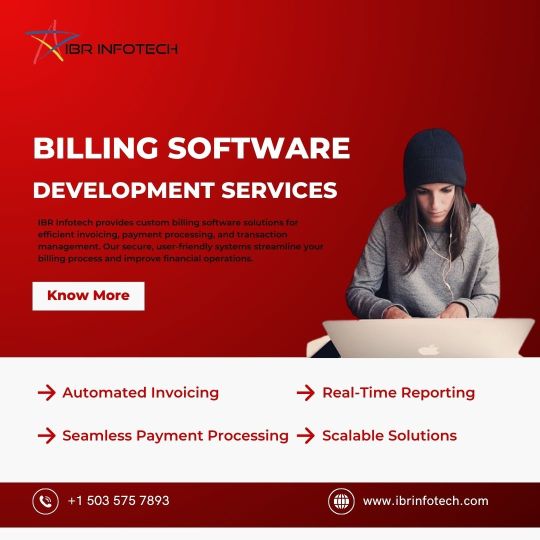
Billing Software Development Services IBR Infotech
IBR Infotech specializes in providing custom billing software development services designed to streamline your invoicing, payment processing, and transaction management. Our solutions offer seamless integration with existing systems, ensuring accurate, automated billing processes that enhance financial operations.
With a focus on user-friendly interfaces and robust security, our billing software helps businesses reduce manual errors, improve cash flow, and maintain compliance. Whether you're a small business or a large enterprise, our scalable solutions can be tailored to meet your specific needs, ensuring efficiency and accuracy across your billing cycles. Let IBR Infotech transform your billing system into a powerful tool for financial management and business growth. Read more -https://www.ibrinfotech.com/solutions/custom-billing-software-development #BillingSoftware #SoftwareDevelopment #CustomBilling #InvoicingSoftware #PaymentProcessing #TransactionManagement #AutomatedBilling #FinancialManagement #SecureBilling #BillingSolutions #ScalableSoftware #BusinessSoftware #CashFlowManagement #BillingSystem #TechSolutions #EnterpriseSoftware #BillingServices #FinancialTech #SoftwareDevelopmentServices
#billing software development#custom billing software#invoicing software solutions#payment processing software#transaction management system#automated billing#secure billing software#financial management software#billing system integration#custom invoicing software#user-friendly billing system#billing software for businesses#financial operations software#automated invoicing solutions
0 notes
Text
Efficient Payment Collection can
Maximize your E-commerce Profits
Unlock the potential of your e-commerce venture! Dive into a real-world success story that reveals the transformative power of streamlined payment collection.
🌟 Case Study:
Meet 'E-Shop India,' an Indian e-commerce startup that achieved a remarkable 30% boost in revenue within a mere three months. The catalyst for this growth? PayerVault, India's leading payment collection API. Explore how this innovative solution transformed their financial operations.
🔑 Key Insights:
Discover the direct impact of efficient payment collection on revenue growth.
Learn how offering diverse payment methods can lead to higher conversion rates.
Get the facts with data-driven insights.
Witness a shift from payment hassles to customer convenience.
🚀 Take your e-commerce business to new heights! Unleash the potential of PayerVault's payment collection solutions and pave the way for revenue growth.
🔗 Read the Full Story: Link to the Case Study
#PaymentCollection #EcommerceSuccess #PayerVault #CaseStudy #RevenueBoost"
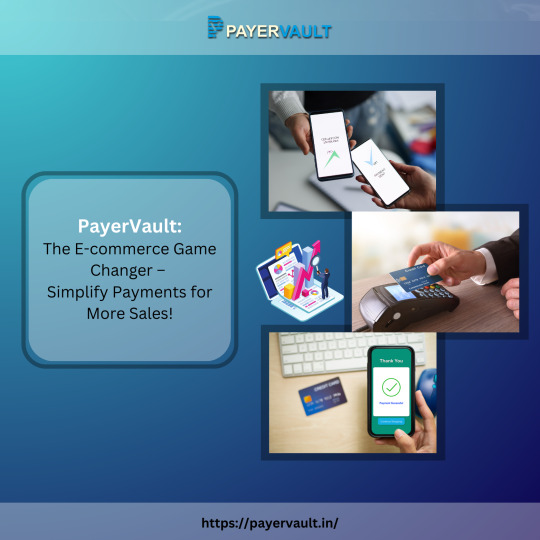
#ecommerce#online store#paying#payment gateway#payments#payouts#payment systems#payment processing#small business#online#payment collection#business growth#sales#shopify#onlinebusiness#ecommerce solutions#ecommerce software development#ecommerce store#payervault#online payment systems#online payment gateway#digital transformation#digital payment solution#payout#payment services#businesses#business#high risk merchant account#high risk payment gateway
0 notes
Text
What does Automation Testing software do?
Automation Testing Services
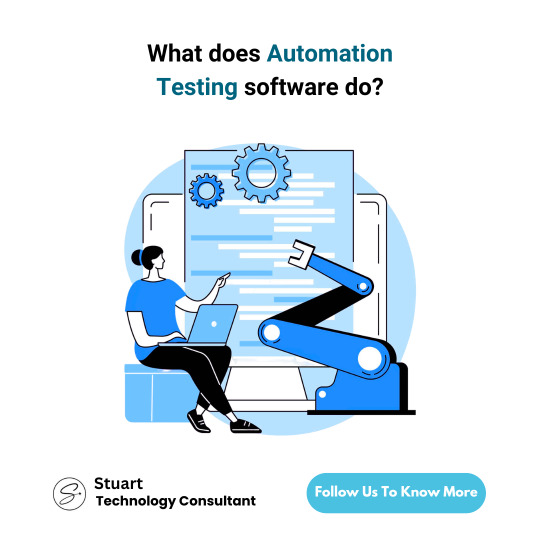
Automation Testing and its software is a tool and useful resource that helps to test applications automatically without any major considerations to look into while testing. Instead of having testers manually check every feature or function, automation tools run pre-written test scripts to check if the software works as expected. These tools can simulate user actions, test various inputs, and quickly and accurately check the software's behavior.
The main goal of automation test software is to save time, reduce human error, and increase testing coverage. It is beneficial when you must run the same tests many times, like regression testing or continuous integration setups.
Key Functions of Automation Testing Software -
Automation testing software performs several tasks that help ensure software quality. It checks if the application meets business requirements, validates data processing, tests user interfaces, and monitors performance under different conditions.
These tools can work across multiple browsers, devices, and operating systems. They help catch bugs early in the development process, reducing the cost and time needed to fix them later.
Many automation tools also integrate with other systems like CI/CD pipelines, test management platforms, and reporting dashboards—making the whole testing and development process smoother.
Benefits of Using Automation Testing Software -
Automation test software helps companies speed up testing, increase accuracy, and launch products faster. It reduces the need for repetitive manual testing, freeing testers to focus on more complex tasks.
The software runs tests 24/7 if needed, offers detailed test reports, and allows quick feedback to developers. It also supports better collaboration between QA and development teams, helping improve overall product quality.
While automation helps a lot, it doesn't fully replace manual testing. QA professionals still need to plan tests, review results, and test complex scenarios that automation can't handle, as they both are essential for the process. Automation Test is best for repetitive and everyday tasks like checking login pages, payment forms, or user dashboards and analytics. It's also helpful in regression testing — where old features must be retested after certain updates or common system upgrades.
Automation Testing software is a must-have tool and essential for modern software development operations as it gives completely transparent and reliable results if opting towards it as it saves time and the efforts of checking manually. It brings speed, reliability, and efficiency to the testing process. Trusted companies like Suma Soft, IBM, Cyntexa, and Cignex offer advanced automation testing solutions that support fast delivery, better performance, and improved software quality for businesses of all sizes.
3 notes
·
View notes
Text
Why Your Business Needs Expert WordPress Development?

1. WordPress: The Platform Built for Growth
WordPress powers over 40% of websites globally—and for good reason. It’s flexible, customizable, and SEO-friendly. Whether you need a sleek portfolio, a content-driven blog, or a high-converting e-commerce store, WordPress adapts to your business needs.
But just having a WordPress site isn't enough. You need experts who know how to unleash its full potential. That’s exactly where expert WordPress website development services step in to make a real difference—turning ideas into digital experiences that work.
2. Custom WordPress Web Design That Reflects Your Brand
Think of your website as your digital storefront—it should feel like your brand, speak your language, and instantly connect with your audience. Generic templates and cookie-cutter designs just don’t cut it anymore.
At Cross Atlantic Software, our team specializes in creating fully customized WordPress web design solutions. We take the time to understand your brand, audience, and business goals—then design a website that communicates your identity with clarity and impact.
From choosing the right color palettes and typography to structuring user-friendly navigation and responsive layouts, our designs are both beautiful and functional.
3. Speed, Security, and Scalability by Professional Developers
Having a fast, secure, and scalable website is crucial—not just for user experience but also for search engine rankings.
Our skilled WordPress web developers at Cross Atlantic Software don’t just build websites—they engineer digital experiences. We optimize every aspect of your site, from lightweight coding to secure plugins and future-ready architecture.
Whether it’s integrating payment gateways, custom plugins, or third-party APIs, our developers ensure that your site runs smoothly and grows with your business.
4. Search Engine Optimization (SEO) Built-In
What good is a stunning website if no one finds it?
A professional WordPress site should come optimized from the ground up. We integrate best SEO practices into the development process, including keyword placement, metadata, mobile responsiveness, site speed, and more.
This means your website won’t just look good—it will perform well in search results, helping you attract more organic traffic and potential customers.
5. User Experience That Keeps Visitors Coming Back
Today’s users are impatient. If your website is clunky, confusing, or slow, they’ll bounce within seconds.
Our WordPress website development services focus on creating seamless user experiences—fast-loading pages, intuitive navigation, clear call-to-actions, and a design that adapts across all devices.
Great UX doesn’t just please your visitors—it builds trust and drives conversions.
6. Looking for “WordPress Experts Near Me”? We’ve Got You Covered
We know how important it is to work with a team that understands your market. Whether you're searching for WordPress experts near me or want a team that communicates closely and understands your local business context, Cross Atlantic Software bridges the gap.
We offer both local and remote development services, with dedicated project managers who ensure smooth communication and progress at every step.
So, even if we’re not just around the corner, we work as if we are—collaboratively, transparently, and efficiently.
7. You Deserve the Best WordPress Designers Near You
A good design is more than just visual appeal—it’s a strategic asset.
Our WordPress designers near me service ensures you get the best of both creativity and conversion strategy. We blend aesthetics with analytics to craft websites that not only look great but also guide your visitors towards taking action—whether that’s filling out a form, making a purchase, or signing up for your newsletter.
8. Reliable Support and Maintenance
Launching a site is just the beginning.
We offer ongoing support, maintenance, backups, and updates to ensure your website stays healthy and competitive. If you ever run into issues or want to scale, our team is just a call or click away.
In a digital landscape that’s constantly evolving, your website should not only keep up—but lead. Don’t settle for average. With Cross Atlantic Software, you get access to top-tier WordPress website development services that are tailored, tested, and trusted.
Whether you're looking for WordPress web design, reliable WordPress web developers, or trying to find the best WordPress experts near me, we’re here to help.
#wordpress web design#WordPress web developers#WordPress experts near me#WordPress website development services
2 notes
·
View notes
Text
Ready-Made Banks: A Fast-Track Solution for Financial Entrepreneurs

In the ever-evolving financial sector, setting up a new bank from scratch can be a complex, time-consuming, and heavily regulated process. This is where ready made banks offer a strategic advantage. Acquiring a pre-established banking institution with the necessary licenses in place allows financial entrepreneurs to bypass lengthy approval procedures and start operations quickly. In this article, we explore the benefits, processes, and considerations of purchasing a ready-made bank.
What Are Ready-Made Banks?
Ready-made banks, also known as shelf banks, are pre-licensed financial institutions that are available for sale. These banks have already been incorporated, undergone regulatory approvals, and in some cases, have an operational history. Investors and financial service providers can acquire these institutions to accelerate their entry into the banking industry.
Benefits of Acquiring a Ready-Made Bank
Time Efficiency – One of the most significant advantages of purchasing a ready-made bank is the time saved. Establishing a new bank requires extensive regulatory approvals, which can take years. A pre-established bank allows buyers to commence operations almost immediately.
Regulatory Compliance – Ready-made banks typically already comply with financial regulations and have obtained the necessary banking licenses. This reduces the burden of going through rigorous application procedures.
Established Reputation – A bank with an operational history may already have established relationships with regulatory bodies, financial institutions, and clients, providing an easier path to business development.
Access to Banking Infrastructure – Many ready-made banks come with existing banking infrastructure, including financial software, payment processing systems, and client portfolios, enabling seamless transitions.
Global Business Expansion – Investors looking to expand their financial services globally can benefit from acquiring a licensed bank in a strategic jurisdiction.
Considerations Before Buying a Ready-Made Bank
Jurisdiction & Regulations – Different countries have varying regulatory requirements. Buyers should assess the jurisdiction to ensure it aligns with their business goals and legal considerations.
Due Diligence – Conducting thorough due diligence is essential to verify the financial health, compliance status, and potential liabilities of the bank before purchase.
Operational Readiness – Some ready-made banks may be dormant or inactive. Investors should evaluate the bank’s readiness for immediate operations.
Cost Factors – Acquiring a ready-made bank involves substantial investment. Buyers should consider initial costs, operational expenses, and any additional licensing or compliance fees.
Regulatory Approvals for Ownership Transfer – Although a ready-made bank is pre-licensed, regulatory authorities often require approvals for changes in ownership, which should be factored into the timeline.
How to Acquire a Ready-Made Bank
Identify the Right Bank – Research available banks for sale in preferred jurisdictions that match your business objectives.
Engage Financial and Legal Experts – Work with professionals who specialize in banking acquisitions to navigate legal and regulatory complexities.
Due Diligence & Negotiation – Assess the bank’s history, financials, and compliance status before finalizing the purchase.
Regulatory Approval Process – Submit necessary documentation and seek regulatory consent for ownership transfer.
Operational Launch – Once approvals are secured, the new owners can rebrand, implement business strategies, and commence full-scale operations.
Conclusion
Acquiring a ready-made bank is a strategic move for financial entrepreneurs looking to enter the banking industry swiftly. With pre-existing licenses, compliance frameworks, and operational structures, these institutions offer a fast-track solution to financial success. However, due diligence, regulatory compliance, and strategic planning are crucial to ensuring a smooth transition and sustainable operations. Whether for global expansion or niche financial services, a ready-made bank provides a unique opportunity to accelerate growth in the financial sector.
#Banking License for sale#Ready-made financial licenses for sale#Opening offshore bank account in seychelles online#bank license for sale#Banks with licenses for sale
2 notes
·
View notes
Text
Top 6 Cryptocurrency Exchange Clone Scripts you should know in 2025
In thi Article about Top 6 Cryptocurrency Exchange Clone Scripts you should know in 2025, Read it out.

What is Cryptocurrency Exchange
To purchase, sell, or trade cryptocurrencies like Bitcoin, Ethereum, and Litecoin, you go to an online marketplace called a cryptocurrency exchange. Cryptocurrency exchanges work much like stock exchanges, except instead of issuing or trading stocks, you trade digital currencies.
In simple terms, it’s where Buyers and sellers meet to exchange cryptocurrencies. You can buy cryptocurrency with ordinary money (such as dollars or euros) or swap one cryptocurrency for another. Some exchanges allow you to store your crypto in secure wallets held on the platform.
There are two main types:
Centralized exchanges (CEX)
Decentralized exchanges (DEX)
What is Cryptocurrency Exchange Clone Script
The Cryptocurrency Exchange Clone Script is a ready-made program that simulates the technical features and functionality of popular cryptocurrency exchanges such as Binance, Coinbase, Kraken, or Bitfinex. Compared to developing from scratch, the clone scripts significantly ease and shorten the time required to set up a cryptocurrency exchange network for an aspiring entrepreneur and firms.
These sort of scripts are somewhat equipped with all the basic features to run a cryptocurrency exchange, like user account management, wallet integration, order book, trading engine, liquidity management, and options for secure payment gateways. The whole idea of a clone script is to give you something out-of-the-box that can be customized, thus allowing you to skip the whole painful development process but still be able to modify the script to suit your needs.
Top 6 Cryptocurrency Exchange Clone Scripts
There are many clone scripts for cryptocurrency exchange development, but here are the top 6 of the cryptocurrency exchange clone script.
Binance clone script
Coinbase Clone Script
Kucoin Clone Script
Paxful Clone Script
WazirX clone script
FTX Clone Script
Binance clone script
A Binance clone script is a Pre-made software that is almost ready for use to create your own cryptocurrency exchange platform, along the way simulating Binance, one of the largest and most popular exchanges in the world. This “clone” is a reapplication of some of the features and functionality of Binance, but it can allow for some level of customization depending upon your particular brand and need.
Key Features:
User Registration and Login
Multi-Currency Support
Trading Engine
Multi-Layer Security
Admin Dashboard
Wallet Integration
KYC/AML Compliance
Liquidity Management
Mobile Compatibility
Referral and Affiliate Program
Trading Fees and Commission Management
Live Market Charts and Trading Tools
Coinbase clone script:
The Coinbase clone script is a ready-made solution that allows you to set up a cryptocurrency exchange platform exhibiting features and functionalities similar to the world’s most popular and user-friendly crypto exchange, Coinbase. These scripts are bundled with all the necessary features to run an exchange while still offering ample customization to cater to your branding and business requirements.
Key Features:
User Registration and Account Management
Fiat and Crypto Support
Secure Wallet Integration
Quick Buy/Sell Functionality
Multiple Payment Methods
P2P Trading
Admin Dashboard
Launchpad Functionality
Staking Feature
KYC/AML Compliance
API Integration
Kucoin Clone Script
A KuCoin clone script is a ready-made software solution replicating all functional attributes and operational features of the KuCoin, which can also be customized according to your brand name and business requirement specifications. Fast and feasible for launching your crypto exchange, the idea is to save yourself from the headaches of developing everything from scratch.
Key Features:
Spot trading
Margin trading
Future trading
Crypto derivatives
Advanced security transactions
Escrow protection
User registration
Wallet integration
Advanced analytics
Currency converter
Paxful clone script
A Paxful clone script is a ready-Made platform for opening a peer-to-peer cryptocurrency exchange for users to trade Bitcoin and other cryptocurrencies directly among themselves without any intermediaries. The script replicates the core features of Paxful operated using its server; you can customize it to your brand and business needs.
Key Features:
Secured Escrow Service
Multi Payment Processing
BUY/SELL Ad posting
Real-Time Data
Referrals & Gift Card options
Multi Language Support
Online/Offline Trading
Cold/Offline Wallet Support
FTX Clone Script
An FTX clone script is a ready-made software solution that will allow you to set up your own cryptocurrency exchange like FTX, which was formerly one of the largest crypto exchanges globally before going under in 2022. This script mimics the core features of FTX, such as spot trading, derivatives, margin trading, token offering, etc., so that you can fast-track the launch and operations of your own exchange with customizable branding and features.
Key Features:
Derivatives Trading
Leveraged Tokens
Spot Trading
User-Friendly Interface
KYC/AML Compliance
Staking Functionality
WazirX clone script
A WazirX Clone Script is a pre-made software solution for the creation of your cryptocurrency exchange platform akin to WazirX, one of the top cryptocurrency exchanges in India. The clone script replicating the essential elements, functionality, and WazirX’s user experience enables you to swiftly put together a fully fledged cryptocurrency exchange that would accept a number of digital assets and trading features.
Key Features:
Escrow protection
KYC approval
Trading bots
User-friendly interface
Stunning User Dashboard
SMS Integration
Multiple Payment Methods
Multiple Language Support
Benefits of Using Cryptocurrency Exchange Clone Scripts
The use of a cryptocurrency exchange cloning script entails great advantages, particularly if one is keen on starting an exchange without having to do the full development from scratch. Below, I have listed the primary advantages of using cryptocurrency exchange cloning scripts:
Cost-Effective
Quick and Profitable Launch
Proven Model
Customizable Features
Scalability
Multi-Currency and Multi-Language Support
Low Development Cost
Continuous Support and Updates
Why Choose BlockchainX for Cryptocurrency Exchange clone script
In the opinion of an entrepreneur set to develop a secure, scalable, and feature-loaded cryptocurrency exchange clone script, BlockchainX is the best bet. Since BlockchainX provides a full-fledged solution that replicates the features of flagship cryptocurrency exchanges such as Binance, Coinbase, and WazirX, the entrepreneur gets all the additional features required practically out of the box. With the addition of certain basic offerings such as spot trading, margin trading, and peer-to-peer (P2P) capabilities along with more advanced ones like liquidity management and derivatives trading, BlockchainX provides a holistic set of solutions to carve out an exchange rightly fitted for newbies and pros alike.
Conclusion:
In conclusion, the Top 6 Cryptocurrency Exchange Clone Scripts in 2025 are high-powered and feature-rich solutions which any enterprising spirit would find indispensable if they were to enter the crypto market very quickly and efficiently. Whether it be a Binance clone, Coinbase clone, or WazirX clone-these scripts offer dynamic functionalities that enhance trading engines, wallets, KYC/AML compliance, and various security attributes.
Choosing the right clone script, such as those provided by BlockchainX or other reputable providers, will give you a strong foundation for success in the dynamic world of cryptocurrency exchanges.
#cryptocurrency#cryptocurrency exchange script#exchange clone script#binance clone script#clone script development#blockchainx
2 notes
·
View notes
Text
What Are the Costs Associated with Fintech Software Development?

The fintech industry is experiencing exponential growth, driven by advancements in technology and increasing demand for innovative financial solutions. As organizations look to capitalize on this trend, understanding the costs associated with fintech software development becomes crucial. Developing robust and secure applications, especially for fintech payment solutions, requires significant investment in technology, expertise, and compliance measures. This article breaks down the key cost factors involved in fintech software development and how businesses can navigate these expenses effectively.
1. Development Team and Expertise
The development team is one of the most significant cost drivers in fintech software development. Hiring skilled professionals, such as software engineers, UI/UX designers, quality assurance specialists, and project managers, requires a substantial budget. The costs can vary depending on the team’s location, expertise, and experience level. For example:
In-house teams: Employing full-time staff provides better control but comes with recurring costs such as salaries, benefits, and training.
Outsourcing: Hiring external agencies or freelancers can reduce costs, especially if the development team is located in regions with lower labor costs.
2. Technology Stack
The choice of technology stack plays a significant role in the overall development cost. Building secure and scalable fintech payment solutions requires advanced tools, frameworks, and programming languages. Costs include:
Licenses and subscriptions: Some technologies require paid licenses or annual subscriptions.
Infrastructure: Cloud services, databases, and servers are essential for hosting and managing fintech applications.
Integration tools: APIs for payment processing, identity verification, and other functionalities often come with usage fees.
3. Security and Compliance
The fintech industry is heavily regulated, requiring adherence to strict security standards and legal compliance. Implementing these measures adds to the development cost but is essential to avoid potential fines and reputational damage. Key considerations include:
Data encryption: Robust encryption protocols like AES-256 to protect sensitive data.
Compliance certifications: Obtaining certifications such as PCI DSS, GDPR, and ISO/IEC 27001 can be costly but are mandatory for operating in many regions.
Security audits: Regular penetration testing and vulnerability assessments are necessary to ensure application security.
4. Customization and Features
The complexity of the application directly impacts the cost. Basic fintech solutions may have limited functionality, while advanced applications require more extensive development efforts. Common features that add to the cost include:
User authentication: Multi-factor authentication (MFA) and biometric verification.
Real-time processing: Handling high volumes of transactions with minimal latency.
Analytics and reporting: Providing users with detailed financial insights and dashboards.
Blockchain integration: Leveraging blockchain for enhanced security and transparency.
5. User Experience (UX) and Design
A seamless and intuitive user interface is critical for customer retention in the fintech industry. Investing in high-quality UI/UX design ensures that users can navigate the platform effortlessly. Costs in this category include:
Prototyping and wireframing.
Usability testing.
Responsive design for compatibility across devices.
6. Maintenance and Updates
Fintech applications require ongoing maintenance to remain secure and functional. Post-launch costs include:
Bug fixes and updates: Addressing issues and releasing new features.
Server costs: Maintaining and scaling infrastructure to accommodate user growth.
Monitoring tools: Real-time monitoring systems to track performance and security.
7. Marketing and Customer Acquisition
Once the fintech solution is developed, promoting it to the target audience incurs additional costs. Marketing strategies such as digital advertising, influencer partnerships, and content marketing require significant investment. Moreover, onboarding users and providing customer support also contribute to the total cost.
8. Geographic Factors
The cost of fintech software development varies significantly based on geographic factors. Development in North America and Western Europe tends to be more expensive compared to regions like Eastern Europe, South Asia, or Latin America. Businesses must weigh the trade-offs between cost savings and access to high-quality talent.
9. Partnering with Technology Providers
Collaborating with established technology providers can reduce development costs while ensuring top-notch quality. For instance, Xettle Technologies offers comprehensive fintech solutions, including secure APIs and compliance-ready tools, enabling businesses to streamline development processes and minimize risks. Partnering with such providers can save time and resources while enhancing the application's reliability.
Cost Estimates
While costs vary depending on the project's complexity, here are rough estimates:
Basic applications: $50,000 to $100,000.
Moderately complex solutions: $100,000 to $250,000.
Highly advanced platforms: $250,000 and above.
These figures include development, security measures, and initial marketing efforts but may rise with added features or broader scope.
Conclusion
Understanding the costs associated with fintech software development is vital for effective budgeting and project planning. From assembling a skilled team to ensuring compliance and security, each component contributes to the total investment. By leveraging advanced tools and partnering with experienced providers like Xettle Technologies, businesses can optimize costs while delivering high-quality fintech payment solutions. The investment, though significant, lays the foundation for long-term success in the competitive fintech industry.
2 notes
·
View notes
Text
IT companies in Coimbatore :Hiring freshers role and benefit
Coimbatore has emerged as a preferred location for IT professionals due to its affordable cost of living, high-quality educational institutions, and the city’s well-developed infrastructure. Unlike metropolitan cities, IT companies in Coimbatore offers a balanced lifestyle with a lower cost of living, which appeals to many working professionals. With a pool of skilled talent graduating from nearby engineering and technical institutions, Coimbatore is an ideal place for IT companies to find qualified candidates for various roles, making it a hot spot for job seekers.

Who Are the Leading IT Companies in Coimbatore?
The city hosts several top IT companies, including Tata Consultancy Services (TCS), Cognizant, Wipro, and Robert Bosch, along with growing regional players like KGISL and Aspire Systems. These companies offer a variety of services from software development to business consulting and automation solutions. Working with such companies not only provides a chance to learn and grow but also adds credibility to one's career profile. Their well-established infrastructure and focus on training employees make them attractive employers in the region.
Best IT Companies in Coimbatore :
Coimbatore, one of Tamil Nadu's major industrial hubs, has seen significant growth in the IT sector. Known for its skilled workforce, affordable infrastructure, and a supportive business ecosystem, the city hosts many IT companies that offer a wide range of services from software development to digital transformation.

Here’s a look at some of the best IT company in Coimbatore :
Accenture :

Global consulting and technology services company providing full-fledged IT and business process services.
ThoughtWorks:

Leaders in software consultancy to get custom software developed through agile methodology and digital transformation
Payoda Technologies :

focuses primarily on aspects of digital transformation, analytics, cloud solution development and software development.
Sridhar Vembu Institute of Technology (Zoho Corp) :

It is based in Chennai; however, the innovation and research wing of Zoho is based in Coimbatore, where it works on software product development.
Softratech Info :

The company provides IT solutions, consultancy, software development, and support services.
Repute Network :

A technology-based company, focusing on digital payments, financial technologies, and blockchain solutions
Mindnotix Technologies :
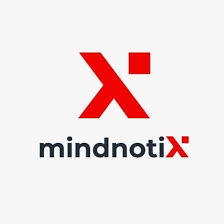
A technology firm, developing web and mobile applications as well as AR/VR-based applications, and AI-driven applications.
Kumaraguru College of Technology :

Technology Business Incubator (KCT-TBI) - Incubates start-ups and tech innovation in IoT, AI, robotics, and software solutions.
Revature India :

Trains and develops software services and products, focusing on creating technical talent for the global market.
i2i Software Solutions :

Offers end-to-end software solutions and IT services, with a focus on custom development.
eQuadriga Software Pvt Ltd :

is an IT services company focusing on software development, mobile apps, and digital marketing.
Conclusion :
Coimbatore’s IT sector is full of opportunities for freshers, thanks to a supportive ecosystem of companies and a growing tech community. From MNCs like Cognizant and Bosch to dynamic startups, IT companies in Coimbatore provides ample options for fresh graduates eager to kickstart their careers. With a focus on learning, networking, and skill development, freshers can build a promising career in this thriving city.
#it company#IT companies in Coimbatore#internship#freshers it job#jobseekers#jobs#employment#careers#workplace#inside job
3 notes
·
View notes
Text
What Is a White Label Product and How Does It Work?
It's possible that products offered by some of the most well-known corporations in the world are not as uncommon as you might think. The company that actually produces their branded products is an outsider that markets the same things under different labels. White labelling is a well-known commercial strategy that is applied to numerous consumer product categories.

What does white label mean?
The practice of producing goods and marketing them under several brand names is known as "white labelling." Although white label products may differ in terms of branding, packaging, logos, and even prices, but their fundamental architecture remains the same. Limited product customization options, such as adding a brand logo or design on a product's exterior, may be available from white label manufacturers. In exchange for large orders, they might also give retailers discounts. After a purchase, products from other white label services, such print-on-demand businesses, are shipped straight to customers.
What are white label products?
White label products are produced by a different company than the one that markets or even sells them. The benefit is that multiple businesses can handle different aspects of the product development and sales process. Depending on their area of competence and inclination, three firms can concentrate on different aspects of the product: producing, marketing, and selling. The main advantages of white label branding for businesses are the time, energy, and financial savings on production and marketing expenses.
Another significant benefit of private label brands is that if a supermarket has an exclusive agreement with a manufacturer, the company may have cheaper average transportation costs and distributional economies of scale. The shop was able to offer the product for less and still make a larger profit margin due to decreased delivery expenses.
The rise in popularity of private label products indicates that customers are becoming less devoted to their preferred established brands and more price-conscious. The rise of private label brands in several nations is negatively impacting the market share of national brands or manufacturers.
White Label Branding Examples-
Electronics Industry:
Electronics manufacturers frequently white label their goods under different brand names. For example, a manufacturer may make tablets or smartphones for businesses that rebrand and sell the products under their own name.
Beauty and Personal Care:
The beauty and personal care industries are big on white labeling. A large number of private label cosmetic firms’ contract with other manufacturers to make their goods; these manufacturers create white label products and package them under the private label brands' names.
Grocery and Retail:
Frequently found in supermarkets and big-box stores, white label products are produced by outside vendors and marketed under the supermarket's own name. These consumer goods include everything from food products like snacks and canned foods to cleaning supplies and household goods.
Payment Processing:
White label payment processing solutions are frequently provided by payment gateway providers. This makes it possible for companies to seamlessly integrate the payment gateway into their operations and provide their clients payment processing services under their own identity.
Software:
Numerous web hosting providers provide best white label solutions that can be altered and rebranded by other enterprises. Email marketing platforms offer white-label software alternatives that enable agencies to sell email marketing services under their own brand.
Financial Services:
Financial institutions sell financial services and goods to other businesses under a white label. White labeling branded credit cards, prepaid cards, and even banking solutions are examples of this, in which the partner company's branding and client experience are tailored.
Web Hosting:
White label hosting is a service that many web hosting providers provide. Because of this, resellers are able to offer web hosting packages under their own brands, with the main web hosting provider handling the setup and maintenance for the web hosting.
A huge number of people have discovered their calling in the web hosting industry, which has grown to be quite large. With over 126 million web hosting companies based there, its valuation is predicted to reach over $83 billion by 2021. White label hosting is a component of that sector. Reseller hosting is directly related to it.
It becomes an affordable option for small businesses to enter the web hosting industry and launch their own web hosting company when paired with white label reseller hosting. In order to help you resale hosting and launch your business, we will go over the steps and information you need to know in this post.
White Label Reseller Hosting: What Is It?
Finding a parent provider to purchase resources from and selling their servers, bandwidth, RAM, and other components are examples of this. You should not handle the technical specifications, server management, or maintenance on your own. It essentially lets you run your own web hosting company without having to deal with all the difficult technical aspects. Many providers also have their own reseller programs because it has become a popular choice among users.
Working of white label reseller hosting?
You need to first find a parent provider and buy a reseller plan in order to receive web hosting services if you want to engage in the white label web hosting industry and operate a reseller hosting website. Once you've selected a parent company, you can launch your hosting company.
With white label web hosting, you want to charge your clients more than you did when you bought the reseller plan and acquired the required resources from your parent provider. By doing this, you avoid having to spend any time or money on your own server setup or other resource purchases.
What does White label Reseller Hosting include?
User-Friendly Control Panel
An essential tool for managing websites is a user-friendly control panel. You can make backend changes and, if required, provide the client access via control panel access.
Scalable
If your clientele is growing or you're in charge of a website that needs more server power, reseller hosting should allow you to increase server resources.
Integrated Billing
WHM billing software, which enables you to bill your clients and oversee their payment schedules, is included in the majority of reseller accounts. Thanks to this, making sure your clients pay you on time is no longer a burden.
Integration of Domain and Email
With reseller accounts, you can sell domain names and email account upgrades. These can elevate your services when included in your hosting packages.
Private Name Servers
Thanks to private name servers, your brand and the hosting provider whose servers you're using will become more distinct.
Website hosting always remains in demand. White label hosting allows you to give your clients the choice of operating their server without requiring you to handle any of the expensive or challenging aspects of it.
Make sure to conduct thorough research before deciding on the ideal reseller plan for your company. Locate a reputable host that can provide the ideal server environment for you and your clients.
How White Label Solution Is Better?
There are a number of reasons why white label products might be the best option for your company as a business.
No risk
There is always some risk involved in starting your own business, but part of that danger can be reduced by white labelling your products. Because you're not spending as much money on creating a new product, risk is reduced.
Therefore, you won't lose as much money if the product doesn't work out in the market as you would if you had started from begin with its development. Select a white label product from a reliable supplier to further reduce your risk.
Improved quality assurance
Lastly, you may be confident that white label products will have superior quality control than those that you would make yourself. This is because, compared to you, the white label manufacturer is probably going to have a stronger quality control procedure.
Furthermore, since the white label manufacturer probably produces labels for other businesses, it usually has a group of quality control specialists on staff who can guarantee that the product fulfills your requirements.
Quicker to launch
White label products are also preferred since it can be considerably quicker to bring a product to market with them than it is to design one from the ground up. Once more, this is because you're just rebranding an already-existing product—the production process isn't being started from scratch. Hence, white labelling can be a fantastic choice if you want to launch a product rapidly.
The time to market is the largest advantage of white labelling. It can take months, or even years, to develop a product from scratch, find a manufacturer, and bring it to market. White labelling allows you to expedite that procedure and get your goods onto the market much faster.
More adaptability
Additionally, white label products provide more freedom than creating your own product. For instance, you still have control over the product's logo, packaging, and marketing if you white label it.
This implies that you can design a special product for your brand and customize it to your target market. Furthermore, even if you have less control over the production process, you still have a great deal of influence on how your customers are shown the goods.
Affordable
White label products are popular because they are an affordable means of launching a business. Best White labelling can be a big benefit, especially for small businesses, as it eliminates the upfront expenditures associated with product development, production, and marketing.
The largest financial benefit of white labelling, is that there are no expenses associated with product development or marketing. Rather, you're simply capitalizing on the success of another company's product, allowing you to launch your firm with less overhead and more swiftly."
Lower requirements for minimum orders
also typically have lower minimum order quantities than if you were to produce the product yourself. This is so that the white label manufacturer won't have to start a new production line just to fill your little request because they already have the product in stock.
Therefore, white label products can be a terrific choice if you're just getting started and don't need many products.
Conclusion-
White label products are produced by a same business, then packaged and marketed by other businesses under different brand names. It has been profitable for big-box stores to provide white label products with their own branding.
Since the late 1990s, private label branding has become a global phenomenon that has grown gradually. White label branding offers businesses a number of advantages, including reduced production and marketing expenses, time, and energy expenditures.

Dollar2host Dollar2host.com We provide expert Webhosting services for your desired needs Facebook Twitter Instagram YouTube
4 notes
·
View notes
Text
NVIDIA AI Workflows Detect False Credit Card Transactions

A Novel AI Workflow from NVIDIA Identifies False Credit Card Transactions.
The process, which is powered by the NVIDIA AI platform on AWS, may reduce risk and save money for financial services companies.
By 2026, global credit card transaction fraud is predicted to cause $43 billion in damages.
Using rapid data processing and sophisticated algorithms, a new fraud detection NVIDIA AI workflows on Amazon Web Services (AWS) will assist fight this growing pandemic by enhancing AI’s capacity to identify and stop credit card transaction fraud.
In contrast to conventional techniques, the process, which was introduced this week at the Money20/20 fintech conference, helps financial institutions spot minute trends and irregularities in transaction data by analyzing user behavior. This increases accuracy and lowers false positives.
Users may use the NVIDIA AI Enterprise software platform and NVIDIA GPU instances to expedite the transition of their fraud detection operations from conventional computation to accelerated compute.
Companies that use complete machine learning tools and methods may see an estimated 40% increase in the accuracy of fraud detection, which will help them find and stop criminals more quickly and lessen damage.
As a result, top financial institutions like Capital One and American Express have started using AI to develop exclusive solutions that improve client safety and reduce fraud.
With the help of NVIDIA AI, the new NVIDIA workflow speeds up data processing, model training, and inference while showcasing how these elements can be combined into a single, user-friendly software package.
The procedure, which is now geared for credit card transaction fraud, might be modified for use cases including money laundering, account takeover, and new account fraud.
Enhanced Processing for Fraud Identification
It is more crucial than ever for businesses in all sectors, including financial services, to use computational capacity that is economical and energy-efficient as AI models grow in complexity, size, and variety.
Conventional data science pipelines don’t have the compute acceleration needed to process the enormous amounts of data needed to combat fraud in the face of the industry’s continually increasing losses. Payment organizations may be able to save money and time on data processing by using NVIDIA RAPIDS Accelerator for Apache Spark.
Financial institutions are using NVIDIA’s AI and accelerated computing solutions to effectively handle massive datasets and provide real-time AI performance with intricate AI models.
The industry standard for detecting fraud has long been the use of gradient-boosted decision trees, a kind of machine learning technique that uses libraries like XGBoost.
Utilizing the NVIDIA RAPIDS suite of AI libraries, the new NVIDIA AI workflows for fraud detection improves XGBoost by adding graph neural network (GNN) embeddings as extra features to assist lower false positives.
In order to generate and train a model that can be coordinated with the NVIDIA Triton Inference Server and the NVIDIA Morpheus Runtime Core library for real-time inferencing, the GNN embeddings are fed into XGBoost.
All incoming data is safely inspected and categorized by the NVIDIA Morpheus framework, which also flags potentially suspicious behavior and tags it with patterns. The NVIDIA Triton Inference Server optimizes throughput, latency, and utilization while making it easier to infer all kinds of AI model deployments in production.
NVIDIA AI Enterprise provides Morpheus, RAPIDS, and Triton Inference Server.
Leading Financial Services Companies Use AI
AI is assisting in the fight against the growing trend of online or mobile fraud losses, which are being reported by several major financial institutions in North America.
American Express started using artificial intelligence (AI) to combat fraud in 2010. The company uses fraud detection algorithms to track all client transactions worldwide in real time, producing fraud determinations in a matter of milliseconds. American Express improved model accuracy by using a variety of sophisticated algorithms, one of which used the NVIDIA AI platform, therefore strengthening the organization’s capacity to combat fraud.
Large language models and generative AI are used by the European digital bank Bunq to assist in the detection of fraud and money laundering. With NVIDIA accelerated processing, its AI-powered transaction-monitoring system was able to train models at over 100 times quicker rates.
In March, BNY said that it was the first big bank to implement an NVIDIA DGX SuperPOD with DGX H100 systems. This would aid in the development of solutions that enable use cases such as fraud detection.
In order to improve their financial services apps and help protect their clients’ funds, identities, and digital accounts, systems integrators, software suppliers, and cloud service providers may now include the new NVIDIA AI workflows for fraud detection. NVIDIA Technical Blog post on enhancing fraud detection with GNNs and investigate the NVIDIA AI workflows for fraud detection.
Read more on Govindhtech.com
#NVIDIAAI#AWS#FraudDetection#AI#GenerativeAI#LLM#AImodels#News#Technews#Technology#Technologytrends#govindhtech#Technologynews
2 notes
·
View notes
Text
Harnessing CRM Analytics for Business Growth
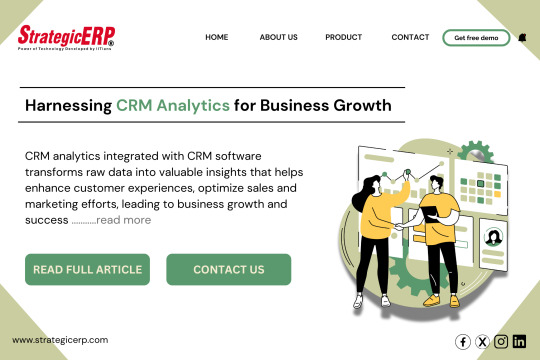
Advanced analytics powered by Artificial Intelligence provides invaluable insights to any business. Integration with AI elevates the reporting capabilities of a Customer Relationship Management system. Fetching data from various points of contact results in forming comprehensive client profiles, which when analyzed provide accurate insights.
Built-in AI features allow the system to generate predictive insights about customer payments, unit bookings, site visits and more. Delivering cutting-edge solutions and insights to its clients is the realm of customer relationship management (CRM) software.
It generally consists of a comprehensive suite of services designed to help businesses leverage the full potential of their data, making data-driven decisions, identifying actionable insights, and driving more personalized customer experiences. CRM Analytics offers a range of services, providing unparalleled value through:
Data Collection
Data Analysis
Reporting
Dashboard Development
Data Visualization
Predictive Analytics
Custom reporting
Data integration
Data is the lifeblood of any business, and the goal of CRM software should be to empower clients with the tools and expertise they need to harness the power of their data for business growth and success. These insights empower companies to make informed decisions, tailor their marketing strategies, enhance customer experiences, and ultimately drive business growth.
Data-Driven Decision Making: CRM analytics transforms raw customer data into actionable insights. Businesses can use these insights to make informed decisions about product offerings, marketing campaigns, sales strategies, and customer service improvements.
Customer Understanding: By analyzing customer interactions, purchase histories, and engagement patterns, businesses can gain a deep understanding of their customers. This understanding helps in segmenting customers, identifying their needs, and tailoring products and services to better serve them.
Personalized Marketing: It enables businesses to create personalized marketing campaigns. By knowing individual preferences, purchase histories, and browsing behaviors, companies can deliver targeted and relevant messages to customers, increasing the chances of conversion.
Sales Performance Improvement: CRM analytics provides sales teams with data on lead conversions, sales cycles, and customer buying patterns. This information can help identify areas for improvement, optimize sales processes, and allocate resources more effectively.
Customer Retention and Loyalty: Understanding customer behaviors and preferences allows businesses to proactively address issues, offer personalized solutions, and foster customer loyalty. Satisfied customers are more likely to remain loyal and recommend the company to others.
Forecasting and Planning: CRM analytics can provide insights into future trends and demands by analyzing historical data. This helps businesses forecast sales, plan inventory levels, and allocate resources appropriately.
Identifying Cross-Selling and Upselling Opportunities: By analyzing customer purchasing patterns, businesses can identify opportunities for cross-selling or upselling additional products or services, increasing revenue per customer.
Monitoring Marketing Campaign Effectiveness: CRM analytics helps evaluate the success of marketing campaigns by tracking metrics such as click-through rates, conversion rates, and customer engagement. This allows for real-time adjustments and optimizations.
Improving Customer Service: By analyzing customer service interactions and feedback, businesses can identify common issues and areas for improvement. This leads to better service quality and enhanced customer satisfaction.
Competitive Advantage: Companies that effectively use CRM analytics gain a competitive edge by making data-driven decisions that are aligned with customer needs and market trends.
CRM analytics becomes an essential part of the software. It enables businesses to gain valuable insights into customer behaviors, preferences, and interactions.
3 notes
·
View notes
Text
Submission Window: November 1st - December 31st, 2023 Payment: 8 cents per word Theme: Resource Scarcity We are seeking stories for an anthology to be titled We Are All Thieves of Somebody's Future which will collect stories with the theme: Resource Scarcity - using up the last of a critical resource and dealing with the aftermath. While stories could be dystopic (ex. the last tree), authors could also explore hopepunk (losing a resource leads to something unforeseen and positive), solarpunk (a pollution laden resource leads to a better solution), fantasy (the last dragon). We are open to all genres. All stories are requested to be between 1000 and 3000 words in length. Authors may explore any genre with their stories and we encourage a wide variety of ideas and interpretations. Submission Dates Submissions open: November 1st, 2023 Submissions close: December 31st, 2023 Reading/Review begins: January 1, 2024 Reading/Review ends: February 29, 2024 All authors will be contacted by: April 15, 2024 General Submission Information We like to seek out new authors and book ideas ourselves rather than be contacted directly because we are a small, self-funded press, and only publish 4-5 books a year. We usually offer open call submissions on anthologies we decide to do, or we contact authors directly if we have particular needs. We pay $0.08/word for the stories we publish. Most of our books are limited editions of between 100 and 200 copies and we prefer to print physical books over creating ebooks. The Air and Nothingness Press is interested only in publishing works created by the individual, creative efforts of human authors. We are not completely opposed to the use of AI as a tool to develop art or writing, rather we are opposed to the use of it in place of art or writing. If you "wrote" a story by supplying an AI with a prompt, we are not interested. Stories by authors who have employed any AI text-generation software, apps, services, or any other computer-assisted service or program in the writing of their submissions, including plot generators, human-machine "collaboration," titling, outlining, or any other form of computer driven influence on their creative process other than spelling and grammar checking will not be considered. Via: Air and Nothingness Press.
9 notes
·
View notes
Text
What is the difference between AI testing and automation testing?
Automation Testing Services

As technology continues to evolve, so do the methods used to test software. Two popular approaches in the industry today are AI testing and Automation Testing. While they are often used together or mentioned side by side, they serve different purposes and bring unique advantages to software development. Let's explore how they differ.
What Is Automation Testing?
Automation Testing involves writing and crafting test scripts or using testing tools and resources to run the tests automatically without human intervention. As it's commonly used to speed up repetitive testing tasks like regression testing, performance checks, or functional validations. These tests follow a fixed set of rules and are often best suited for stable, predictable applications with its implementation. Automation Test improves overall efficiency, reduces human error, and helps the developers and coders to release software faster and with precise detailing.
What Is AI Testing?
AI testing uses artificial intelligence technologies like ML, NLP, and pattern recognition to boost their software testing process and operations. Unlike Automation Tests, AI testing can learn from data, predict where bugs might occur, and even adapt test cases when an application changes. While it makes the testing process more innovative and flexible, especially in complex and tough applications where manual updates to test scripts are time-consuming.
Key Differences Between AI Testing and Automation Testing:
Approach: Automation Test follows pre-written scripts, while AI testing uses the data analysis and learning to make precise decisions with ease.
Flexibility: Automation Test requires the updates if the software changes or adapts to new terms; AI testing can adapt automatically and without any interpretation.
Efficiency: While both of the testing methods aim to save time, AI testing offers more intelligent insights and better prioritization of test cases with its adaptation.
Use Cases: Automation Tests are ideal and suitable for regression tests and routine tasks and common testing. AI testing is better suited for dynamic applications and predictive testing.
Both methods are valuable, and many companies use a combination of Automation Testing and AI testing to achieve reliable and intelligent quality assurance. Choosing the correct method depends on the project's complexity and testing needs. Automation Test is best for repetitive and everyday tasks like checking login pages, payment forms, or user dashboards and analytics. It's also helpful in regression testing — where old features must be retested after certain updates or standard system upgrades.
Companies like Suma Soft, IBM, Cyntexa, and Cignex offer advanced automation test solutions that support fast delivery, better performance, and improved software quality for businesses of all sizes.
#it services#technology#saas#software#saas development company#saas technology#digital transformation
2 notes
·
View notes
Text
Physical media discourse on here feels... weird (this is a long post)
I agree on a fundamental level that the move towards drm-based streaming licenses is bad, and that the perpetual-personal-content license (read: the license most DVDs are under) is a thing we should maintain, at least as a stopgap until the vanguard of communism empowers us to rewrite IP law.
That said, the language positioning Physical vs Digital, the insistence that anything other than physical media is bad, and the upholding of DVDs as a gold standard, all read to me as kinda tech-iliterate, and thus ignorant of the real issue at hand.
The primary issue with streaming, which folks on Tumblr *have* correctly identified, is to do with Access control.
The primary issue with streaming is that it requires a regular subscription payment, to exclusively view content under a license that can be revoked at any time for any reason.
This is the mechanism by which Netflix can kick you off your friend's account, this is also the mechanism by HBO can scrub Infinity Train from existence as a tax write-off.
This system is unequivocally bad, and the reason it's bad is because of DRM and Access Control. This may seem pedantic, but is an important distinction.
Let's take a look at DVDs now. Most DVDs are distributed under a license that grants you perpetual access to view in a private setting, but not to redistribute the content.
This is what that FBI warning that plays at the top of every DVD is trying to tell you, and is why ripping a DVD, while simple, is technically illegal.
Because the video file is hard-encoded into the DVD, and its proliferation largely predates the IOT zeitgeist, *most* DVDs don't contain any access control measures beyond that legal text, but this is not universal.
youtube
This is a great video outlining FlexPlay, an ill-faded technology that used a disk with light-sensitive material, that over the course of about a week or two, blacked out the disk rendering its contents un-viewable.
I bring this up because it highlights two issues.
One, DVDs aren't a physically resilient technology.
Disks are fragile, and even moderate scratches or damage can render a disk unreadable. This is a point of contention retro gamers have had for years, because while their NES cartridges still work, their PS1 disks don't.
This is not even to mention how the plastic of every broken disk still exists somewhere in the world, and will for centuries.
Two, it shows that IP conglomerates, have been at this for years, and won't be stopped in putting Access control into DVDs.
This means that buying DVDs of new shows forever is not an end-game solution. Unless you are content to stop consuming new media, eventually you're going to encounter a DRM protected disk.
To use another more recent example, remember when the Xbox One came out? They had this giant controversy over how playing a game locally on the disk still required online access to Microsoft's servers.
Your physical media could be locked right up for any reason by the platform itself. How can we trust that if DVDs or Blu Ray made a comeback that they would not suffer the same fate?
So where do we go from here, if physical media isn't safe?
Let's consider what digital video *is*. It's a file, same as any other. .mp4 .mov
Some, like .mp4 support DRM-encryption (although don't always contain any). Others, like .ogv exist free from DRM, thanks open source software developers.
Likewise, with a DRM encrypted digital file, because all of the data is hosted locally, just encrypted, there are ways to remove or bypass that encryption, because the VAST majority of cyber-security depends on a lack of knowledge.
This website has a number of very good resources both on drm-free digital storage mediums, and the process of removing certain types of DRM from digital files, (and was my primary resource for this paragraph)
https://www.defectivebydesign.org/so_youve_got_some_questions_do_you#:~:text=To%20avoid%20DRM%20and%20other,webm)%2C%20or%20Daala.
Storing your media as unlocked files presents the best of both worlds.
You have full control over access to your media, you own those files just as much as you own the hard drive you store them on.
You can buy media online, so long as the distributor gives you a media file instead of a streaming portal. You can also choose to obtain media files through other means, that's none of my business.
And you can do some really cool stuff like setting up a self-hosted media server, allowing you streaming-like remote access to all of your media, without ceding any ownership over that media. (Jellyfin is the most popular open-source solution but there are others) https://jellyfin.org/
And absolutely none of this is to mention the ways in which you can SUPPORT YOUR LOCAL LIBRARY, WHO MOST LIKELY HAS STREAMING OPTIONS.
In the US most public libraries maintain Kanopy and hoopla memberships, allowing you to access streamed content from your local library.
This has the added benefit of keeping the library's usage statistics up, which often helps them with securing more funding.
While you don't own the media, you also don't have to pay for it, and you crucially don't have to give your money to streaming services and IP hoarders.
It requires 0 technical background, and presents a more sustainable and equitable view of what streaming can look like.
So in conclusion:
Make sure you own the content you're paying for, and accept nothing less.
Don't be convinced that your DVDs are immune.
Learn some basics about networking, filetypes, cyber security and self-hosting if you really care about this stuff.
Support Open Source Software
Support Your Local Library
5 notes
·
View notes
Text
The Role of Flexible Payment Gateway Integration in Sachin Dev Duggal's Builder.ai's Success
Flexible payment gateway integration has played a pivotal role in the success story of Sachin Dev Duggal's Builder.ai, revolutionizing the way businesses approach app development. With a vision to democratize software development, Duggal recognized the importance of seamless payment processing for clients worldwide.
Builder.ai's success hinges on its ability to cater to diverse business needs while ensuring a smooth and efficient payment experience. By integrating flexible payment gateways, Builder.ai empowers clients to choose from a variety of payment methods, accommodating their preferences and enhancing convenience.
The integration of flexible payment gateways not only streamlines the payment process but also fosters trust and reliability among clients. Whether it's credit card payments, online banking, or alternative payment methods, Builder.ai ensures that transactions are secure and hassle-free.
Moreover, flexible payment gateway integration aligns with Builder.ai's commitment to innovation and adaptability. It allows the company to stay ahead of industry trends and meet the evolving demands of its clientele, ultimately contributing to its sustained growth and success.
In essence, the role of flexible payment gateway integration in Sachin Dev Duggal Builder.ai's success cannot be overstated. It serves as a cornerstone of the company's customer-centric approach, facilitating seamless transactions and driving customer satisfaction. As Builder.ai continues to redefine the landscape of app development, its commitment to flexible payment solutions remains unwavering, laying the foundation for future achievements.
#artificial intelligence#builder ai news#builder.ai#sachin dev duggal#sachin dev duggal author#sachin dev duggal builder.ai#sachin dev duggal ey#sachin duggal#sachin duggal builder.ai#sachin dev duggal news
2 notes
·
View notes
Text
How AI is Reshaping the Future of Fintech Technology

In the rapidly evolving landscape of financial technology (fintech), the integration of artificial intelligence (AI) is reshaping the future in profound ways. From revolutionizing customer experiences to optimizing operational efficiency, AI is unlocking new opportunities for innovation and growth across the fintech ecosystem. As a pioneer in fintech software development, Xettle Technologies is at the forefront of leveraging AI to drive transformative change and shape the future of finance.
Fintech technology encompasses a wide range of solutions, including digital banking, payment processing, wealth management, and insurance. In each of these areas, AI is playing a pivotal role in driving innovation, enhancing competitiveness, and delivering value to businesses and consumers alike.
One of the key areas where AI is reshaping the future of fintech technology is in customer experiences. Through techniques such as natural language processing (NLP) and machine learning, AI-powered chatbots and virtual assistants are revolutionizing the way customers interact with financial institutions.
Xettle Technologies has pioneered the integration of AI-powered chatbots into its digital banking platforms, providing customers with personalized assistance and support around the clock. These chatbots can understand and respond to natural language queries, provide account information, offer product recommendations, and even execute transactions, all in real-time. By delivering seamless and intuitive experiences, AI-driven chatbots enhance customer satisfaction, increase engagement, and drive loyalty.
Moreover, AI is enabling financial institutions to gain deeper insights into customer behavior, preferences, and needs. Through advanced analytics and predictive modeling, AI algorithms can analyze vast amounts of data to identify patterns, trends, and correlations that were previously invisible to human analysts.
Xettle Technologies' AI-powered analytics platforms leverage machine learning to extract actionable insights from transaction data, social media activity, and other sources. By understanding customer preferences and market dynamics more accurately, businesses can tailor their offerings, refine their marketing strategies, and drive growth in targeted segments.
AI is also transforming the way financial institutions manage risk and detect fraud. Through the use of advanced algorithms and data analytics, AI can analyze transaction patterns, detect anomalies, and identify potential threats in real-time.
Xettle Technologies has developed sophisticated fraud detection systems that leverage AI to monitor transactions, identify suspicious activity, and prevent fraudulent transactions before they occur. By continuously learning from new data and adapting to emerging threats, these AI-powered systems provide businesses with robust security measures and peace of mind.
In addition to enhancing customer experiences and mitigating risks, AI is driving operational efficiency and innovation in fintech software development. Through techniques such as robotic process automation (RPA) and intelligent workflow management, AI-powered systems can automate routine tasks, streamline processes, and accelerate time-to-market for new products and services.
Xettle Technologies has embraced AI-driven automation across its software development lifecycle, from code generation and testing to deployment and maintenance. By automating repetitive tasks and optimizing workflows, Xettle's development teams can focus on innovation and value-added activities, delivering high-quality fintech solutions more efficiently and effectively.
Looking ahead, the integration of AI into fintech technology is expected to accelerate, driven by advancements in machine learning, natural language processing, and computational power. As AI algorithms become more sophisticated and data sources become more diverse, the potential for innovation in fintech software is virtually limitless.
For Xettle Technologies, this presents a unique opportunity to continue pushing the boundaries of what is possible in fintech innovation. By investing in research and development, forging strategic partnerships, and staying ahead of emerging trends, Xettle is committed to delivering cutting-edge solutions that empower businesses, drive growth, and shape the future of finance.
In conclusion, AI is reshaping the future of fintech technology in profound and exciting ways. From enhancing customer experiences and mitigating risks to driving operational efficiency and innovation, AI-powered solutions hold immense potential for businesses and consumers alike. As a leader in fintech software development, Xettle Technologies is at the forefront of this transformation, leveraging AI to drive meaningful change and shape the future of finance.
#Fintech Technologies#Fintech Software#Artificial Intelligence#Finance#Fintech Startups#technology#ecommerce#fintech#xettle technologies#writers on tumblr
6 notes
·
View notes